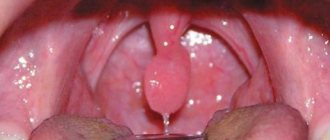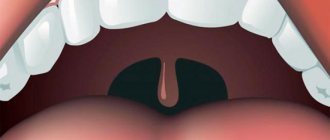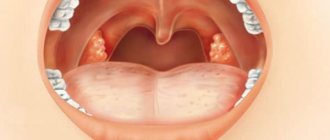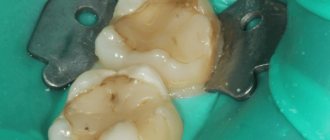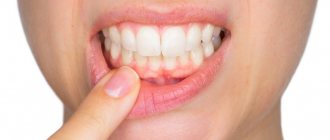What is the tongue silent about? Yes, yes, today we will tell you about a small conical-shaped process that hangs over the root of the tongue. Why, in fact, about him? This topic was prompted by a question from one of the patients: “why is it needed, this tongue?” And we thought, why not tell us more about it. After all, practically no one pays attention to him! Nevertheless, the tongue performs many important functions! And we decided to restore justice! So, the uvula, or uvula palatine, is a small conical process of the posterior edge of the soft palate, consisting of connective tissue.
Why do you need a tongue?
The uvula in the throat is a palatal process that resembles a small bell. Its main function at the junction of the larynx and palate is protective. It prevents bacteria, viruses and pathogenic microorganisms from entering the throat and lower respiratory tract. The tongue covers the throat from cold air when walking on a frosty day. It also distributes air flow.
The tongue is located above the larynx, and when it enlarges, the functions of swallowing, breathing, and speech are impaired. The swollen organ can increase in size by 5 times. Because of this, it falls on the tongue, causing gag reflexes.
Abuse of bad habits
As surprising as it may be, excessive alcohol consumption and frequent smoking can also lead to swelling of the uvula mucosa. What measures to take in such a situation?
Doctors advise drinking as much warm liquid as possible. Why do this? If the kidneys and urinary system work at an accelerated rate, the body will quickly cleanse itself of toxins. If a person drinks little fluid, intoxication may last several days.
The following will also help speed up the recovery process:
- maintaining proper nutrition;
- maintaining oral hygiene;
- complete cessation of alcohol and smoking (at least for the duration of treatment).
Uvulitis is a dangerous pathology that, in the absence of competent and timely treatment, can cause various complications. That is why, in order to maintain your health, when the first symptoms of a disorder occur, you must immediately visit a doctor.
If discomfort in the throat occurs, which turns into painful sensations, treatment must be carried out immediately. The tongue tends to increase in size; it is necessary to monitor its condition.
Causes of swelling
Swelling of a small organ is a symptom indicating the development of an infection or other pathology. In 25% of cases, an inflammatory process develops on the uvula, even in this case the disease is a consequence of inflammatory reactions, for example, tonsillitis, pharyngitis, laryngitis.
Swelling is caused by the development of bacteria: streptococci, staphylococci. Viruses, especially influenza, parainfluenza and adenoviruses, are also causes. Only in 20% of cases can the uvula become swollen due to the spread of a fungal infection.
One of the reasons for swelling of the tongue is an allergic reaction. It can develop through contact with various substances or as a result of taking medications.
A tumor of the uvula develops from factors:
- pathologies of the oral cavity and nasopharynx;
- neoplasms, benign and malignant uvula or adjacent elements;
- surgery to remove tonsils;
- throat surgery;
- injuries, burns of the tongue;
- inhalation of toxic substances, dust;
- drinking hot drinks and food.
Inflammatory processes in the pharynx and pharyngeal ring develop due to dry mucous membranes, hormonal imbalances due to pregnancy, menopause, adolescence, or the use of hormonal medications. In this case, the greater damage occurs on the tongue.
Risk groups include smokers and people who drink alcohol excessively. If a person has reduced immunity due to chronic endocrine or systemic pathologies, a swollen uvula will be a consequence of illness.
Due to undeveloped immunity, children are primarily affected by swelling of the uvula. The symptoms are extremely severe. Elderly people are also susceptible to swelling of the uvula, but the signs are not obvious.
Poor treatment of respiratory diseases leads to tumors: if a person gargles with a concentrated soda solution and a decoction of medicinal herbs of various origins.
What is the danger?
The uvula protects the respiratory organs from food particles entering them, distributes warm air, activates processes provoked by the gag or cough reflex, and participates in spoken speech. Acute processes of inflammation of the uvula affect the surrounding soft tissues of the oral cavity, which is not just accompanied by unpleasant sensations, but sharply worsens the general physical condition of the patient and provokes breath holding. Ignoring the pronounced symptoms of the disease can cause asphyxia.
Swelling of the throat and tongue can provoke a number of negative changes in the body:
- Sore throat and fever, weakness in the body - what could it be? What to drink for these symptoms
- difficulties in speaking;
- clogging of the respiratory system with food particles (this case requires an immediate response and can lead to respiratory arrest);
- infection and bacteria of the mucous membranes of the nasopharynx;
- constant unpleasant feeling of nausea, gag reflex;
- inflammation of both tonsils.
Important: swelling of the nasopharynx and palatal tongue is life-threatening and therefore requires prompt medical attention.
Symptoms
It is difficult to miss the swelling of the uvula: the feeling of a foreign body, gagging are unpleasant signs. Even a person who is far from medicine can visually examine the throat and find out that the appendage of the palate is swollen.
But if the tumor is not obvious, other symptoms may indicate a problem:
- increased salivation;
- speech disorder;
- labored breathing;
- pain and sore throat.
Depending on the pathology, severe fever, cough, and runny nose may occur. If a person suffers from allergies, a rash, itching, redness of the skin and swelling of the lips and tongue are possible.
Painful swallowing of saliva during a long conversation or after sleep may indicate a problem. An unpleasant symptom may subside within half an hour. Discomfort may occur when eating, drinking, or sneezing and coughing.
Allergic uvulitis
If the throat uvula swells due to an allergic manifestation, antihistamines (Loratadine, Suprastin, Diazolin) are usually prescribed. To make the recovery of the swollen organ faster, you can use diuretics (Trifas, Veroshripon).
| A drug | Photo | Price |
| Loratadine | From 35 rub. | |
| Suprastin | From 132 rub. | |
| Diazolin | From 57 rub. | |
| Trifas | Check | |
| Veroshripon | From 93 rub. |
If the conical process is so swollen that the patient's life is in danger, it is necessary to use corticosteroids - medications that are prescribed as first aid for allergies to prevent complications. If after taking medications from this pharmaceutical. group, the patient’s condition will not improve, the only solution will be surgical intervention.
You can speed up the recovery process using traditional medicine methods. The patient needs to gargle several times a day with decoctions based on medicinal herbs (raspberry, St. John's wort), an infusion of garlic has also proven itself to be good (100 grams of peeled vegetable, pour 100 ml of water and leave the medicine to infuse for five hours).
Experts warn that if the uvula located on the roof of the mouth constantly swells due to allergies, it is necessary to identify what is the primary source of such a reaction in the body, otherwise the pathology may recur with a certain periodicity and significantly complicate the patient’s life.
Complications
If the uvula on the roof of your mouth is swollen, you must urgently seek medical help, otherwise there will be a rapid development of edema, asphyxia and death.
If the swelling is insignificant, a person may experience difficulty speaking or eating: the feeling of a foreign body causes nausea, as a result the patient refuses to eat and does not receive microelements for the body.
Difficulty breathing slowly but surely leads to dysfunction of internal organs and tissues. The respiratory and cardiovascular systems and meninges are affected.
Our doctors
Debryansky Vladimir Alekseevich
Doctor - otorhinolaryngologist, doctor of the highest category
34 years of experience
Make an appointment
Zharova Galina Gennadievna
Doctor - otorhinolaryngologist, member of the European Society of Rhinologists, doctor of the highest category
40 years of experience
Make an appointment
Gogolev Vasily Gennadievich
Doctor - otorhinolaryngologist
20 years of experience
Make an appointment
Diagnostics
If signs appear, you should consult a doctor: a therapist or an otolaryngologist. If hypersensitivity to one of the components is indicated, the patient will be referred to an immunologist or allergist. If a reactive tumor of the uvula is suspected due to the development of an infection, an infectious disease specialist is also involved in the study.
Visual diagnosis is not enough. It is important to identify the degree of swelling and symptoms, and determine the condition of the body. Therefore they carry out:
- laryngoscopy;
- pharyngoscopy;
- Ultrasound;
- radiography.
It is necessary to prescribe laboratory tests of blood, urine, and scraping of the mucous membrane. If purulent ulcers are visible on the uvula, their contents are examined.
Select equipment
Treatment
If the uvula is swollen, you cannot self-medicate: incorrect actions will lead to a sharp deterioration of the condition. If swelling develops quickly, you should call emergency medical care, the paramedic will give injections with antihistamines and anti-inflammatory drugs and refer the patient to the intensive care unit.
If the tumor of the palatine process is insignificant, you can consult an otolaryngologist yourself. After the examination, the doctor will determine the cause of the pathology and develop a treatment program.
Conservative therapy
Conservative treatment methods are chosen if the patient's condition does not cause concern. If the inflammation is caused by a bacterial infection, the first-line drug is an antibiotic. If the disease began due to the development of a viral or fungal infection, choose the appropriate medication.
A group of medications will help relieve symptoms:
- Antihistamines. If the swelling is not caused by contact with an allergen, medications help relieve swelling.
- Anti-inflammatory. Help eliminate swelling, redness, and pain. At the initial stage, non-steroidal drugs are prescribed; in difficult situations, steroids (hormones) are used.
- Diuretics. They are aimed at relieving puffiness, but the drugs must be taken carefully.
Antiseptics will help eliminate pathogenic microbes. In difficult situations, doctors prescribe injections of antihistamine and anti-inflammatory solutions. For small and moderate tumors, tablets and capsules are used. If swallowing is inconvenient, sprays, gels, solutions, syrups and suspensions are used.
Inhalations with different compositions are remedies for the treatment of uvula swelling. But the compositions for the devices must be chosen by an otolaryngologist.
Physiotherapy
Physiotherapeutic procedures are prescribed to strengthen the body when the main symptoms have already been reduced. To normalize metabolism the following is prescribed:
- magnetic therapy;
- ultrasound therapy;
- UHF;
- electrophoresis;
- phonophoresis;
- applications.
Usually choose one or two courses of 10 days.
Diet
Proper nutrition during treatment of any disease is the key to success. It is necessary to exclude allergens that caused the tumor, and also exclude:
- hot/cold food and drinks;
- spicy;
- pickled;
- sour.
Alcohol and carbonated drinks are prohibited. It is important for the patient to eat foods rich in vitamins, fiber, and carbohydrates.
Surgery
Otolaryngologists and surgeons are doing everything to delay surgery for partial or total removal of the uvula; this will lead to voice impairment. If a person’s life is at risk or the risk of developing disability is increased, then they resort to surgery.
Excision of the swelling is carried out using minimally invasive methods: laser, cryotherapy, ultrasonic scissors (scalpel). With these methods, stitches are usually not required because the edges of the wound are sealed using laser light or ultrasound. But if necessary, self-absorbing sutures are applied.
Treatment of uvulitis at home: symptoms, inhalations, antibiotics and medications
Uvulitis is an acute inflammation of the tongue in the throat. The tongue is located in the back of the soft palate, and under normal conditions a person cannot feel it.
The disease occurs suddenly and very acutely, accompanied by pain, especially when swallowing. The patient has difficulty breathing, there is a feeling that there is something in the throat that prevents him from swallowing, like a foreign body.
Coughing only worsens the patient's condition. Against this background, dysphonia and pain in the tongue develop.
Uvulitis is a very unpleasant disease. Most often this occurs after tonsillitis or adenotomy.
The tongue is the last extension of the soft palate, located in the yawning cavity above the root of the tongue. Not only is it a sequel, but the entire soft palate is set on fire. The tongue is rich in blood vessels, so various inflammatory and infectious processes often occur in this part of the throat.
The celestial tongue has a number of important functions:
- provides the correct structure of speech sounds
- produces a cough and gag reflex
- prevents foreign bodies from entering the throat
- separates air flows and gives them direction
- heats the air
Causes of inflammation
Usually the soft palate and tongue are not felt. However, when inflammation occurs, the tongue becomes red, swollen and causes severe pain.
People with tonsils removed are predisposed to pathology.
Uvulitis is believed to be the result of disruption of the venous plexus located in the tongue. This phenomenon can also be caused by vascular ruptures or infections in the mouth.
This happens in the following cases:
- consumption of cold drinks
- hot liquid or food that causes a non-allergic reaction to burn
- chronic angina
- tongue injury caused by severe coughing or sudden sneezing in the nasopharynx
Symptoms of the disease
The disease develops very quickly. At the initial stage, the symptoms of uvulitis are not pronounced. Breathing is not impaired, there is a feeling of a coma in the throat, a change in voice, swallowing and speech disorders. The tongue becomes larger and swells a little.
Moderate to severe uvulitis has more pronounced symptoms:
- dysphonia (voice disorder)
- false vomiting
- increase in body temperature
- hypersalivation (increased salivation)
- Swelling and tender soft palate
- Painful swallowing syndrome
- Feeling of perforation in the throat
The most common signs of uvulitis are observed in the morning, after sleep. The first step is a thorough oral examination. If the tongue becomes bright red and enlarged, then most likely the cause of the discomfort is uvulitis.
If the tongue has increased several times and reached the tongue, then the lumen of the nasopharynx can be completely closed. This can lead to asphyxia and death, so the patient should be treated immediately in this situation.
Particular caution should be exercised in the presence of this disease in young children, since all processes in the body occur much faster in them, so it is necessary to immediately call an ambulance.
Diagnostic features
If the diagnosis requires clarification, the following procedures must be performed:
- Do a clinical blood test. This procedure helps determine the type of infection (viral or bacterial) and the presence of infection in the body. If the disease is contagious, the number of white blood cells increases. If the disease is allergic, then the number of eosinophils increases.
- bacteria from the throat to determine the microflora that caused inflammation of the tongue. The analysis will help determine the type of pathogen and its susceptibility to the main types of antibiotics.
- If an allergy is suspected, allergy tests should be performed.
- Conduct a histological examination of tongue tissue, x-rays and computed tomography to exclude oncology.
Basic treatment methods
First you need to determine the cause of the disease, and then prescribe medications. Therapy should be comprehensive to eliminate symptoms, eliminate discomfort and promptly improve the patient’s condition.
The following recommendations should be followed:
- Drink plenty of fluids
- Regular wet cleaning
- Ventilation of premises
- Air humidification
- Maintain good personal hygiene
- Use separate dishes
- Follow a diet, namely, exclude foods that irritate the throat
- Quit smoking and alcohol
Ear, nose and throat specialists treat this condition. If the disease is caused by bacteria, antibiotic therapy is necessary.
Local treatment helps relieve swelling and reduce sore throat. Antiseptic sprays (dernat, kameton, ingalipt) can be used for medical purposes, and rinsing the throat can also be done using a decoction of herbs or a soda solution (1 hour of soda per glass of water).
Antibiotics should be prescribed individually after bacterial test results are available. Antibiotics from macrolides, cephalosporins, fluoroquinolones. The most common solutions are azithromycin, moxifloxacin, and ceftazidime.
- Allergic uvulitis is treated with antihistamines (loratodine, cytirizine, rainbow, cetrin), diuretics (mannitol, uregid, furosemide) and glucocorticosteroids for the treatment of respiratory diseases (diprofos, dexamethasone, hydrocortisone).
- The speed of recovery depends on the body's immune system, so it is important to eat a good diet, drink plenty of fluids, take vitamin supplements and pay special attention to vitamin C.
- Surgical interventions are possible only with the development of paratoncillus swallowing abscess and with purulent inflammation in diseases of the dental system.
Solutions for inhalation
One of the most effective therapeutic methods is therapeutic inhalations. It is necessary to prepare a decoction based on thyme, eucalyptus oil and pine buds. Pour 20 grams of buds into a glass of water and boil for 30 minutes.
Then mix 10 grams of thyme with a glass of boiling water and let it boil for 40 minutes. Combine boiling and infusion in a container and add 20 grams of eucalyptus oil.
Place the resulting product in a nebulizer and inhale it at home.
Inhalation edema is also well removed with vasoconstrictor drugs.
Traditional medicine in the treatment of disease
The most commonly used mouthwash is:
- raspberry leaves. Pour boiling water over it and leave for 30 minutes:
- onion peel. Pour 700 ml of boiling water per 1 tablespoon of peel. Leave for about 4 hours.
- Viburnum dried fruit. Pour 1 liter of water per 50 g of fruit and boil for 30 minutes in a bain marie
- garlic infusion. Grind 100 g of garlic and add 150 ml of boiled water. Insist on 5 hours.
Disease prevention
The most important thing is to always treat diseases of the ENT organs in a timely manner. Eliminate all mechanical damage to the oral cavity and, of course, pay attention to oral hygiene. Self-medication is dangerous because it can be fatal.
Prevention
To prevent the development of a tumor of the uvula, otolaryngologists and other specialist doctors recommend:
- Treat acute respiratory diseases. Follow doctors' recommendations for chronic pathologies.
- Avoid contact with allergens.
- Do not take medications uncontrollably.
- Lead a healthy lifestyle.
- Strengthen the immune system (hardening, moderate physical activity, walks in the fresh air, taking vitamin complexes).
Do not consume hot food or drinks, and avoid long-term consumption of cold foods (for example, ice cream).
- Premium Clinic Medical Center. Uvulitis. // [electronic resource]. Access date 06/23/2021
- Luchikhin L. A. Otorhinolaryngology. — 2012
- Blotsky A.A. Inflammatory diseases of the pharynx. — 2015.
- Head and Neck Institute. Uvula. // [electronic resource]. Access date: 05/22/2021
Author: Lyudmila Fedorova Pulmonologist, immunologist, therapist
Pathogenic microbes
If the organ is swollen and taking antihistamines does not bring relief, most likely the illness is caused by mucous infections.
If the disease is of viral origin, you need to take antiviral drugs (Viferon or Arbidol), but when the pathology is caused by pathogenic microbes, you need to take antibiotics.
Often, with infectious uvulitis, various anti-inflammatory sprays are prescribed that fight the causative agents of the inflammatory process and reduce pain.
